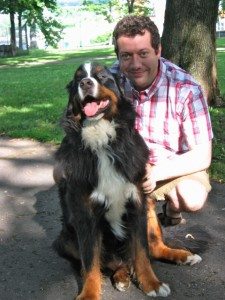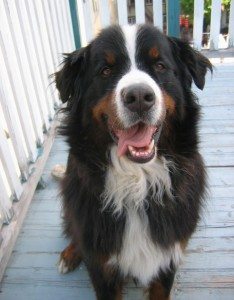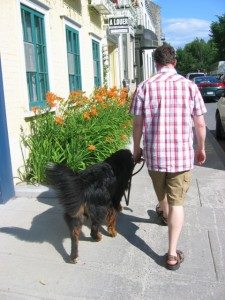Nat here! Those of you with good radio memories may recall Bruce Myers as the morning newsman on Mix 96 Montreal back in the day. He was there when Andre Maisonneuve and I hosted the morning show way back when. Bruce and I were fast friends – and have remained so ever since.
Bruce left radio in 2003 to study for the priesthood and is now an Anglican priest in Quebec City. He recently had to say goodbye to his best friend – far too soon, unfortunately. I’d like to share his article with you now, in the hopes that it will help someone else dealing with the same situation. Losing a pet is difficult, and it’s nice to know that others understand that kind of pain. Thanks for sharing with us, Bruce! xx
Do Dogs Go To Heaven? -by Bruce Myers
My dog died. He was a seven-year-old, somewhat goofy, charmingly disobedient, painfully cute Bernese mountain dog named Calvin, in recognition of the fact he was an ordination gift from my two best friends in seminary, now both Presbyterian clergymen.
 A 10-week-old puppy when we were united, Calvin became almost better known in my first parish than I was, enchanting young and old with equal, slobbery alacrity. When I moved abroad for a year of graduate studies, he moved to the family farm and became as much my mother’s dog as mine. When I returned to Canada and moved to Quebec City, he effortlessly learned to be a canis urbanis. As a single person, Calvin was an especially important part of my life. He was, as the canine stereotype goes, my faithful companion.
A 10-week-old puppy when we were united, Calvin became almost better known in my first parish than I was, enchanting young and old with equal, slobbery alacrity. When I moved abroad for a year of graduate studies, he moved to the family farm and became as much my mother’s dog as mine. When I returned to Canada and moved to Quebec City, he effortlessly learned to be a canis urbanis. As a single person, Calvin was an especially important part of my life. He was, as the canine stereotype goes, my faithful companion.
Last fall a curious lump on Calvin’s lower jaw was eventually diagnosed as an aggressive—and inoperable—cancerous tumour. I was told that treatments of various kinds (a couple of which were tried) might slow the cancer’s relentless march, but ultimately the tumour would render Calvin unable to eat and cause him significant pain, at which point euthanasia would be the humane option.
As word of Calvin’s terminal prognosis spread, a parishioner called me up to ask, somewhat sheepishly, “Is it okay if I pray for your dog?”
“Of course,” was my unhesitating reply. After all, I’d been praying for him. And like many pets, Calvin had been blessed by a priest (by an archbishop, no less). If the church deemed a dog worthy of receiving God’s blessing, then surely a dog in distress merits our prayers.
However, realizing that was the very limited extent of my theological rationale on the matter, I decided my parishioner’s question—and others that stemmed from it—deserved a more thorough reply. Ultimately the question became: what place, if any, do animals have in the economy of salvation?
Our tendency is to think of salvation in purely human terms. “Are you saved?” is still a question habitually posed by Christians of a certain ilk. The image it often kindles is one of disembodied souls finding their eternal rest in some celestial realm beyond our view. But rarely, if ever, are animals—or any other aspect of non-human creation for that matter—seen in the frame of this post-mortem picture. Dogs or fish or birds don’t have souls, right? So they can’t be saved. Right?
Both scripture and the church’s tradition suggest otherwise. In a number of places, the Bible emphasizes that all creatures are of God’s making and are important in God’s sight. The Bible’s very first chapter tells us that after bringing into being the birds of the air, the fish of the sea, and “cattle and creeping things and wild animals of the earth of every kind,” God declared them all to be “good” (Gen. 1:20-25).

When God promises to never again wreak mass destruction though flood waters, the covenant established is not only with Noah and the rest of humankind, but “with every living creature of all flesh” (Gen. 9:15).
Jesus said that even sparrows—birds that in his time were sold as a commodity for next to nothing—are of great value in God’s sight (Lk. 12:6). “If God so loves the little birds,” as the childhood hymn goes, “I know he loves me too.”
Later, the apostle Paul broadened this understanding further still. When he speaks of redemption in his letter to the Romans, he suggests that it’s not just human beings, but “the whole creation” that will participate in God’s saving work in Jesus Christ (Rom. 8:18-23).
The church of the first few centuries seems to have been highly conscious of this more holistic and integrated view of God’s creation. A prayer attributed to the great fourth-century bishop, Basil of Caesarea, entreats God to
enlarge within us
the sense of fellowship with all living things,
our brothers the animals
to whom you gave the earth as their home
in common with us.
We remember with shame that in the past
we have exercised the high dominion
of humans with ruthless cruelty
so that the voice of the earth
which should have gone up to you in song,
has been a groan of travail.
May we realize that they live not for us alone
but for themselves and for you,
and that they love the sweetness of life.
The concern expressed by Saint Basil’s prayer for the integrity of creation, including “our brothers the animals,” resonates as clearly in today’s ecologically troubled times as it did when it was composed nearly 1,700 years ago.
Saint Basil’s prayer also points to a rich, ancient Christian tradition that doesn’t view animals as some kind of soteriological flotsam, but rather sees the lives of non-human creatures as bound up with ours—both in this life and the next. “In his way to union with God,” wrote the twentieth-century Eastern Orthodox theologian Vladimir Lossky, “man in no way leaves creatures aside, but gathers together in his love the whole cosmos disordered by sin, so that it may at last be transfigured by grace.”
Somewhere along the way, the church in the west lost, forgot, or deliberately set aside this wider, cosmic understanding of God’s redeeming work. This theological deficit is partially revealed by the paucity of prayers for animals, something being remedied in part by the relatively recent revival of animal blessing services on or around the feast of Saint Francis of Assisi. Anglican priest and theologian Andrew Linzey has also sought to restore a place for non-human creatures in our theology and liturgical life through books like Animal Rites: Liturgies of Animal Care.
Because of the work of Linzey and others, we in the western church are in the process of receiving back from Eastern Orthodox Christianity the gift of understanding the divine acts of creation and salvation as inextricably connected and vast in their breadth. The God in Christ through whom “all things came into being” (Jn. 1:3) will in time’s fullness also “gather up all things in him, things in heaven and things on earth” (Eph. 1:10). What God has created, God will redeem.
Including, I believe, my dog. I obviously don’t know that for certain. But neither do I know for certain that I or anyone else is “going to heaven”—whatever that means. Like everyone else who believes without having yet seen, I hold to what we celebrate most joyfully during this Easter season: the sure and certain hope of the resurrection to eternal life through our Lord Jesus Christ.
My sure and certain hope is that all of God’s creation—even goofy, disobedient, cute, cancer-stricken Calvin—will somehow share in that resurrection.
 Montreal Dog Blog Montreal's Online Dog Park
Montreal Dog Blog Montreal's Online Dog Park





